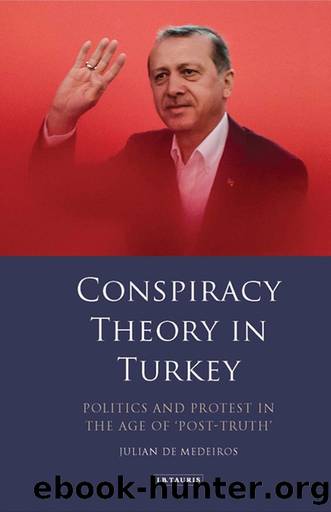Conspiracy Theory in Turkey: Politics and Protest in the Age of 'Post-Truth' by Julian de Medeiros

Author:Julian de Medeiros [Medeiros, Julian de]
Language: eng
Format: epub
ISBN: 9781350985810
Google: aMNQyQEACAAJ
Goodreads: 43804395
Publisher: I.B. Tauris
Published: 2018-01-15T07:41:44+00:00
CHAPTER 4
CONSPIRACY THEORY, STRONGMAN POLITICS AND THE GEZI SPIRIT
Introduction: Spirit of the Strongman Leader
Whether one considers ErdoÄan as the triumphant father figure of contemporary Turkey, a Turkish strongman or, alternatively, as a colourful sultan or despot, he undoubtedly shares all the characteristics of a conspiratorial figure in the public imagination. His own image is continuously being crafted, shaped and manipulated in the multidimensional interpretations that his persona engenders.1 The challenge therefore, and particularly in light of the coup attempt, is to find a mode of viewing Turkeyâs enigmatic leader in a more systematic and less normative manner. So rather than simply identifying the symptoms of paranoid politics in Turkey as the direct outcome of ErdoÄanâs polemical style, this chapter demonstrates how the potential of the strongman âspiritâ can be juxtaposed with that of the Gezi spirit and, in turn, argues that both renditions of either a âspirit of resistanceâ or of strongman leadership become integrated into the conspiratorial framing strategy. In other words, instead of considering ErdoÄan as either a despotic figure or a magnanimous president, this final chapter seeks to determine what is essentially a final antinomy of conspiracy theory in Turkey, that of the dissonance between the âspirit(s)â of resistance and that of the strongman leader.
As such, any directly normative assessments of President ErdoÄanâs leadership style will be largely discarded for the purpose of this chapter. Rather, what I mean to suggest is that the popular notion of a so-called âGezi spiritâ (Gezi Ruhu) lends itself to a conspiratorial interpretation (a key vulnerability of the momentum-oriented mobilization strategy) inasmuch as the strongman leader requires the notion of a conspiratorial Other to act out his power vis-Ã -vis such opposition. The dialectical relationship these spirits thus take on, and how they both infuse each other with meaning, is the primary focus of this chapter.
It is therefore not so much a matter of whether the Gezi protests or the coup âchangedâ ErdoÄanâs leadership style, inasmuch as we should consider how the idea of such resistance has become integral to, and integrated into, the continued legitimacy (or lack thereof) of his political authority. So while the Gezi protests and the coup certainly reinforced pre-existing contentions in Turkey, they also provided a pathway for the consolidation of state power, and an opportunity for ErdoÄan to make his mark on Turkish history in a way that might have not been possible without such resistance. And while we may speculate as to whether ErdoÄan may have held authoritarian ambitions prior to the Gezi protests, it strikes me as more important, and more theoretically valid, to instead situate the particular appeal (and contradictions) of the strongman leadership style with that of the appeal (and contradictions) of conspiratorial framing and conspiracy theory in the wake of the Gezi protests.
In the strongman mode of leadership, opposition becomes a political expedient aiding the strongmanâs success. The more resistance he faces, the more he is called upon to restore order, and, in turn, the more turmoil he can create, the more he can ensure his continued relevance.
Download
This site does not store any files on its server. We only index and link to content provided by other sites. Please contact the content providers to delete copyright contents if any and email us, we'll remove relevant links or contents immediately.
| Bahrain | Egypt |
| Iran | Iraq |
| Israel & Palestine | Jordan |
| Kuwait | Lebanon |
| Oman | Qatar |
| Saudi Arabia | Syria |
| Turkey | United Arab Emirates |
| Yemen |
Empire of the Sikhs by Patwant Singh(23086)
The Wind in My Hair by Masih Alinejad(5095)
Rise and Kill First by Ronen Bergman(4789)
The Templars by Dan Jones(4689)
The Rape of Nanking by Iris Chang(4213)
12 Strong by Doug Stanton(3550)
Blood and Sand by Alex Von Tunzelmann(3205)
Babylon's Ark by Lawrence Anthony(2679)
The History of Jihad: From Muhammad to ISIS by Spencer Robert(2629)
No Room for Small Dreams by Shimon Peres(2368)
Inside the Middle East by Avi Melamed(2357)
The Turkish Psychedelic Explosion by Daniel Spicer(2357)
Gideon's Spies: The Secret History of the Mossad by Gordon Thomas(2353)
Arabs by Eugene Rogan(2299)
The First Muslim The Story of Muhammad by Lesley Hazleton(2271)
Come, Tell Me How You Live by Mallowan Agatha Christie(2260)
Bus on Jaffa Road by Mike Kelly(2160)
1453 by Roger Crowley(2031)
Kabul 1841-42: Battle Story by Edmund Yorke(2029)
